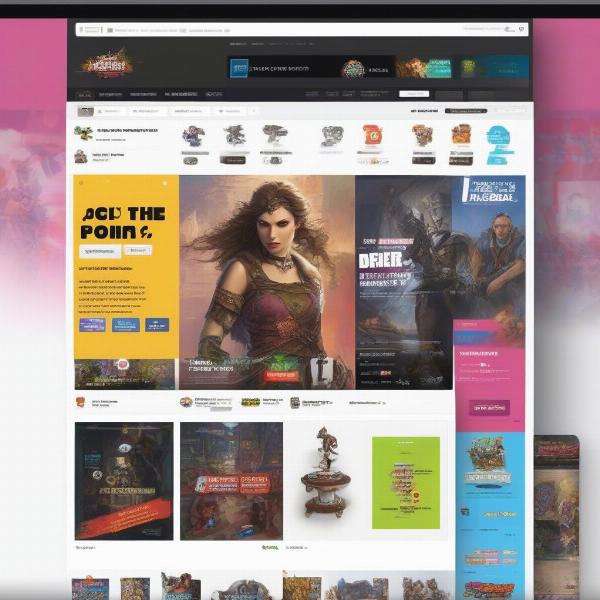The video game industry is booming, making now an exciting time to consider How To Start A Video Game Store. Whether you’re a seasoned gamer, a budding entrepreneur, or just passionate about the interactive entertainment world, opening a video game store can be both rewarding and challenging. This guide will equip you with the essential knowledge and practical steps to turn your dream into a reality.
Selling video games requires understanding your target audience. Are you focusing on retro games, the latest releases, or a mix of both? This crucial decision will influence everything from your inventory to your marketing strategy. Once you’ve identified your niche, creating a solid business plan is paramount. This plan will be your roadmap to success, outlining your financial projections, marketing strategies, and operational plans. Securing funding is another crucial step; consider options like small business loans, personal savings, or investors.
After the initial planning stages, finding the perfect location for your video game store is key. Consider foot traffic, accessibility, and proximity to your target demographic. Is your ideal customer base online or do they prefer a brick-and-mortar experience? Next, you’ll want to design an engaging and functional store layout. Think about how to create an inviting atmosphere that encourages browsing and discovery. Finally, building relationships with suppliers is crucial for securing a steady stream of inventory at competitive prices.
Developing a strong online presence is essential in today’s digital landscape. Creating a website and utilizing social media platforms can significantly expand your reach and engage potential customers. How you market your store will significantly impact your success. Consider online advertising, local partnerships, and community events to promote your business. Customer service is king, especially in the gaming community. Providing excellent service will foster loyalty and generate positive word-of-mouth referrals.
Defining Your Niche and Target Audience
Understanding your target audience is crucial for success. Are you catering to hardcore gamers, casual players, or families? Perhaps you want to specialize in retro gaming or focus solely on new releases. Defining your niche will help you tailor your inventory, marketing efforts, and overall store experience. For example, stocking rare collectible games can attract a different customer base compared to offering the latest esports titles. Knowing your customer inside and out will guide your decision-making process.
Building a Solid Business Plan
A well-structured business plan is essential. Think of it as the blueprint for your video game store. This document should outline your business goals, target market, financial projections, marketing strategy, and operational plan. It should also address potential challenges and how you plan to overcome them. A robust business plan will not only guide your decisions but also help secure funding from investors or lenders. It should also incorporate how you plan to sell video games, both online and in-store.
 Video Game Store Business Plan Outline
Video Game Store Business Plan Outline
Securing Funding and Managing Finances
Starting a video game store requires capital. Explore various funding options, including small business loans, personal savings, crowdfunding, or seeking investors. Once you have secured funding, managing your finances effectively is critical. This includes tracking expenses, managing inventory, and pricing your products competitively. Developing a comprehensive financial plan will help you stay on track and make informed decisions about the future of your business. This is as important as understanding how to make a video game without coding.
Location, Layout, and Supplier Relationships
Choosing the right location for your store is paramount. Consider factors like foot traffic, accessibility, and proximity to your target audience. A well-designed store layout is also essential for creating an inviting and engaging shopping experience. Think about how to display your products effectively, create designated areas for different game genres, and ensure comfortable browsing for customers. Finally, establishing strong relationships with reliable suppliers is crucial for securing a steady stream of inventory at competitive prices. Just like learning where to advertise your game is vital, choosing the right location and suppliers is equally crucial.
Building an Online Presence and Marketing Your Store
In today’s digital age, having a strong online presence is essential. Create a website for your store and actively engage with potential customers on social media platforms. Consider online advertising, local partnerships, and community events to promote your store and build brand awareness. Similar to knowing where to advertise your game, understanding how to market your store effectively online is crucial for success.
 Effective Online Marketing Strategies for Video Game Stores
Effective Online Marketing Strategies for Video Game Stores
Providing Excellent Customer Service
Providing top-notch customer service is crucial in the gaming industry. Knowledgeable and friendly staff can make a huge difference in creating a positive shopping experience. Building relationships with your customers will foster loyalty and generate positive word-of-mouth referrals, which are invaluable for any business. Just as important as knowing how to play the games is providing excellent customer service, fostering a sense of community among your clientele.
Expanding Your Offerings and Adapting to Trends
Once your store is established, consider expanding your offerings beyond just selling games. Think about hosting tournaments, offering repair services, or selling gaming accessories. Staying up-to-date on industry trends is also essential for long-term success. This might involve exploring new gaming technologies, embracing esports, or incorporating virtual reality experiences into your store. You could consider offering game recording services, similar to how to record football games, catering to the content creation needs of gamers.
 Expanding Your Video Game Store's Offerings
Expanding Your Video Game Store's Offerings
Related Considerations: Legal and Regulatory Compliance
Navigating the legal and regulatory landscape is another critical aspect of starting a video game store. This includes obtaining the necessary business licenses and permits, complying with tax regulations, and understanding age rating systems for video games. Consulting with a legal professional can help you ensure that your business operates within the bounds of the law. Did Snapchat get rid of games? While not directly related to running a store, understanding platform trends and player preferences is vital.
Conclusion
Starting a video game store is an exciting venture, but it requires careful planning, dedication, and a passion for gaming. By following the steps outlined in this comprehensive guide, you’ll be well on your way to building a successful business in the thriving video game industry. Remember that adapting to market trends and consistently providing excellent customer service are key to long-term growth and success in the ever-evolving world of gaming. Now that you know how to start a video game store, take the leap and bring your vision to life!
FAQ
-
What are the startup costs for a video game store? Startup costs can vary greatly depending on factors like location, size, and inventory. A realistic range is typically between $20,000 and $50,000.
-
How can I attract customers to my video game store? Effective marketing, community engagement, and excellent customer service are key to attracting and retaining customers.
-
What are the biggest challenges of running a video game store? Competition from online retailers, managing inventory, and staying ahead of industry trends can be significant challenges.
-
Do I need any special licenses to sell video games? You’ll need a general business license, and possibly a resale permit depending on your location. Consult your local authorities for specific requirements.
-
How can I stay up-to-date on the latest video game trends? Following industry news, attending gaming conventions, and engaging with the gaming community online are great ways to stay informed.
-
What are some effective ways to manage inventory in a video game store? Implementing a point-of-sale system, tracking sales data, and forecasting demand can help optimize inventory management.
-
How can I create a unique and engaging in-store experience? Consider hosting events, creating themed displays, and fostering a welcoming community atmosphere.

